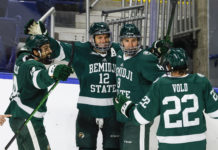First and foremost, congratulations to the Union College Dutchmen for their national championship. There is little more to be said about the program’s rise, the team’s resilience, the coaches’ influence, or the way the team played in Philadelphia and indeed all year long than what has been already said. Union is the only team to enter the offseason with a win (there hasn’t been just one such team in at least 15 years, if not longer), and becomes the 21st member of the NCAA Division 1 Men’s Ice Hockey championship fraternity.
Yale staked the claim; Union builds the foundation
Around this time last season, I wrote an emotional, stream-of-consciousness, thoroughly sincere piece about ECAC Hockey’s title-game monopoly, and what it meant not only for the schools involved, but for the entire ECAC community after a 24-year championship drought.
Last April, Quinnipiac – 30-7-5 and the No. 1 team in the nation at the time – faced Yale (21-12-3), a team that stunned college hockey with upset wins over Minnesota, North Dakota, and UMass-Lowell on the road to the finale. QU hadn’t lost to Yale in two seasons (4-0-1), and nearly ended the Bulldogs’ season with a consolation-game win in Atlantic City three weeks prior.
We all know what happened next; there are some clever t-shirts out there that succinctly sum up Yale’s perspective on the matter. Yale had its first men’s hockey title, the greater New Haven hockey scene had a lot to crow about, and the ECAC had climbed itself out of the rut. Yet, there were detractors.
In a perfect world, I myself would prefer playoffs and championships to be decided in best-of series rather than one-and-done contests; there is too much opportunity for luck and circumstance to affect the outcome in the current format. Would Yale really have beaten Minny, UND or UML in best-of-threes, much less all three of them? Were the Bulldogs really the best team last year… or just the best (or luckiest) team on the ice in four late-March, early-April contests? Chances are about 100 percent that a lot of people out there are glumly nodding along with these rhetorical questions. Even if ECAC Hockey “deserved” (however you interpret that word in this context) the national crown last year, was Yale really the league member most worthy?
Don’t get me wrong, I am not trying to take anything away from the 2012-13 Yale Bulldogs or the program as a whole. They played inspired hockey when it mattered most, and that’s all you can ever ask of a team. Heck, an ECAC team could theoretically finish a season with a national championship and a 10-34 overall record (since, as in many leagues, all teams make the playoffs), so criticizing Yale’s road to the top is at best a philosophical exercise; at worst, sour grapes.
Union’s championship vine, however, bears no foul fruit: The Dutchmen did not score any true upsets on their way up the podium. Union finished the season with the best winning percentage in D-I (.810, 54 points better than second-place Minnesota; last year, Yale finished seventh at .635), the most wins (32, three ahead of Ferris State), the fewest losses (6: Minnesota had 7, Boston College, 8), and a 17-game unbeaten streak (16-0-1). They boasted the country’s second-highest average scoring margin (+1.67; BC had +1.75), a top-five defense (2.14 goals-against per game, fourth), and its second-best offense (3.81; BC, again, was first at 4.10). Bluntly put, critics don’t have a leg to stand on when it comes to this year’s D-I champs.
The point
Despite some evidence to the contrary, this is not a compare-and-contrast bit. This is the milder-mannered sequel to last year’s aforementioned brag blog, in which I build upon my prior point:
ECAC Hockey is again the home of the national champion, and Union’s run should leave no doubt as to the veracity of the conference’s consistency and level of competition. In April 2013, the Yale Bulldogs fought for a plot on a plum piece of land that hadn’t seen an ECAC visitor in over a generation. The Blue & White planted the seeds, at least in the minds of many outside observers.
This year that land not only bore some exceptional fruit, but its resultant nectar spills light and effervescent into a crystalline flute. Cheers to the Dutchmen, and to all that was the 2013-14 college hockey season.
